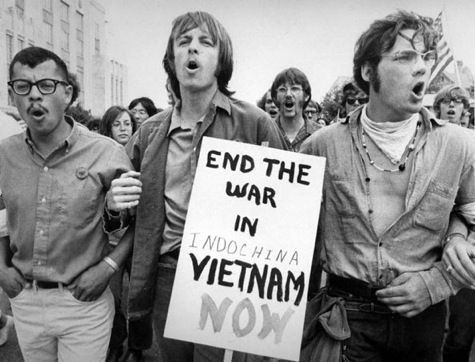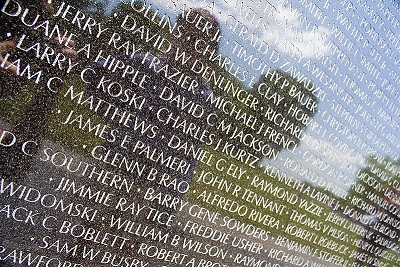
The Vietnam War split the country like no other event in our history. It lasted for over 10 years, and resulted in the deaths of 58000 of our soldiers. Many said we were justified in the fight to stop Communism. Others, including soldiers who'd returned from Vietnam, protested and worked tirelessly to stop the war. Is it our duty to support the war effort when we have soldiers risking their lives? Or are we justified in saying "no" when we think a war is wrong?
Gimme an F!
Gimme a U!
Gimme a C!
Gimme a K!
What's that spell?
What's that spell?
What's that spell?
Well come on all of you big strong men
Uncle Sam needs your help again
He's got himself in a terrible jam
Way down yonder in Vietnam
Put down your books and pick up a gun
We're gonna have a whole lot of fun
These were the words of Country Joe McDonald at the Woodstock festival on August 16, 1969. He captivated nearly 1/2 million people with the signature Vietnam War protest song. I'm sure most of the 1/2 million Woodstock goers were against the war by this time, as was much of the country. At the same time, nearly 1/2 million troops were in Vietnam fighting and dying every day. The country was experiencing in 1969 one of the biggest splits since the Civil War.
How did we get to this point? How is it that both sides could claim the moral high ground so passionately?
Vietnam in the early 1960s was split between the North and the South after years of being a French colony. The North under Ho Chi Minh was a Communist state, and we were in the middle of the Cold War and the Communist hysteria in the 1960s. The insurgency in the North threatening the South fit right into the domino theory, where first Vietnam would be Communist, then Cambodia, Laos, and the rest of the region. Given that the early 60s had brought the Berlin Wall and the Cuban missile crisis, it's easy to see how losing South Vietnam was thought to be a serious threat. Even in hindsight, we cannot overstate how the Cold War drove our foreign policy at the time.
What's hard to reconcile is how each step in the escalation of the war brought us further into the dark side, with this "ends justify the means" logic. There were many steps, but the first big one was the Gulf of Tonkin resolution. On August 2, 1964 and again on August 4 a US destroyer was fired upon presumably by North Vietnamese torpedo boats. On August 7, Johnson requested and got from Congress a resolution which authorized him to use force. His speech to the American people began with:
As President and Commander in Chief, it is my duty to the American people to report that renewed hostile actions against United States ships on the high seas in the Gulf of Tonkin have today required me to order the military forces of the United States to take action in reply.
It was revealed later that these attacks very likely never occurred. Johnson was quoted in 1965 as saying:
For all I know, our Navy was shooting at whales out there.
Saving the South from Communism (and by extension ourselves and the world) became the justification for every misstep that followed. Everyone from President Johnson to Defense Secretary McNamara to General William Westmorland repeatedly said we were making progress and if we had more troops we would be able to win the war. But little by little the facts contradicted their public statements and the war dragged on.
General William Westmoreland, in a speech to a joint session of Congress in 1967, said
In evaluating the enemy strategy, it is evident to me that he believes our Achilles heel is our resolve ... Your continued strong support is vital to the success of our mission ... Backed at home by resolve, confidence, patience, determination and continued support, we will prevail in Vietnam over the Communist aggressor!
As the war escalated and young people were drafted in greater numbers, public support for the war eroded steadily. Protests against the war occurred at college campuses and in major cities. In 1967 Dr. Martin Luther King came out publicly against the war, as did Senator Robert Kennedy. Protests against the war continued and were legitimized by these great leaders, who were both assassinated in 1968. The Tet Offensive in early 1968 showed many in the country that this war could not be won. The split in the country boiled over at the 1968 Democratic Convention in Chicago, where violence erupted between Mayor Daley's police forces and hundreds of protesters outside the convention hall.
Somehow Richard Nixon was elected in 1968 as he successfully sold his "secret plan" to end the war and achieve "peace with honor". But the draft went on and troops were still in Vietnam throughout Nixon's first term. Nixon took a lot of heat for the incursion into Cambodia in 1970. Then in 1972 after Nixon was re-elected in a landslide and the peace talks with the North were stalled, Nixon launched a massive bombing campaign for a period of two weeks over the Christmas holiday.
There were dissenters. George Ball, Assistant Secretary of State during the Johnson administration, objected to every increase in the war effort, accurately predicting that the war could not be won as early as 1965.
Then there was Daniel Ellsberg. Ellsberg had access to and contributed to a set of top secret documents about the Vietnam War decision making process in our government. To Ellsberg, it was clear that the American people were being lied to about Vietnam. While the public was told the war would be won if we persevered a little longer, these documents, later known as the Pentagon Papers, showed evidence that the war was not winnable and it would lead to many more American casualties than the public was led to believe. Ellsberg felt it was his duty to make these documents public, even if it meant he'd have to go to prison. He secretly made copies of the documents and in 1971 the Pentagon Papers were made public by the New York Times and Washington Post. Ellsberg was subject to prosecution for theft of the documents, but also was subject to harassment from the Nixon Administration's plumbers who sought to discredit him. His psychiatrist Lewis Fielding had his office broken into in a plot carried out by E. Howard Hunt and G. Gordon Liddy. Do you recognize those names? They would later become two of the key figures in the Watergate break-in and coverup.
The soldiers that served in Vietnam must have struggled every day with their own sense of right and wrong. I'm sure most soldiers only hoped they'd come out alive, but part of carrying out their mission was to destroy villages and massacre civilians. How many innocent people were killed because our soldiers did not know who the enemy was? The worst case was the My Lai massacre which occurred on March 16, 1968, in which hundreds of civilians including women and children were brutally murdered by our troops. The most well known murderer at My Lai was Lieutenant William Calley who personally shot many of the civilians and ordered other soldiers to do the same.
Then there were the young people at home who relentlessly protested the war, but knew they could receive a draft notice at any time. I was at summer camp in 1970 as an 11 year old, and my camp counselors played the song "I Feel like I'm Fixing to Die Rag" over and over. To me it was amusing to hear
And it's 1, 2, 3, what are we fighting for
Don't ask me I don't give a damn
My next stop is Vietnam
And it's 5, 6, 7, open the pearly gate
Well there ain't no time to wonder why
Whoopee we're all gonna die
To my camp counselors, this was serious stuff. They might have been in college or working at the time, but each one could have gotten a draft notice at any time and found themselves fighting for their lives in the jungle instead of teaching archery to kids. Many who were drafted faced that dilemma - my government is telling me to report for service, but I know the war is wrong. Do I report for service anyway? Do I apply to be a conscientious objector? Do I go to Canada to avoid the draft? Do I go to prison? Muhammad Ali made the most interesting choice in my mind. To Ali, it's ok the hurt people in the boxing ring but it's not ok to kill them in a war that is wrong.
Vietnam is one of the most compelling events in our history because it forced everyone to take a stand. From Johnson to Nixon to Calley to Ellsberg to the draft resistors and protesters, our country was tested in where we stood on doing the right thing.












SUBMIT A COMMENT